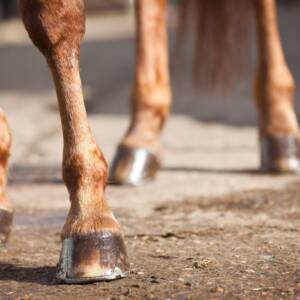The health of your horse’s joints is vital to living a long and enjoyable life. Additionally, Preventative care is critical in maintaining joint health in horses, especially as they age and become more prone to arthritis and joint injuries.
How Do I Promote Good Joint Health in My Horse?
Maintain A Healthy Weight
The best way to promote healthy joints for your horse’s lifetime is to promote a healthy weight. A healthy, balanced diet is an excellent way to maintain your horse’s weight. Regular veterinarian checkups will also inform you about your horse and his health. Obesity causes significant stress on your horse’s joints.
Keeping your horse’s weight in a healthy range will reduce the stress on joints and reduce the risk of developing serious joint issues.
Regular Exercise
Horses were born to move. Regular exercise promotes a healthy weight and allows the joints to function normally. If you can’t exercise your horse daily, turnout in a large paddock or pasture can help keep them moving.
The canter is the best speed for a horse’s joints. It will enable a full range of motions of the joints without too much impact. Higher speeds can lead to serious injuries over time, while lower speeds do not challenge the joints enough.
Medicinal Injections
Veterinarians may prescribe injections to alleviate pain and inflammation in your horse’s joints due to joint injury, damage, or deterioration. Corticosteroid injections are an excellent treatment for inflammation in diseased joints. However, steroidal injections can damage healthy joints. Speak with your veterinarian about the benefits and drawbacks of corticosteroid injections.
What are Common Joint Issues in Horses?
Horses can suffer from joint issues, some from injuries, while others are due to normal joint deterioration.
Common joint issues include:
● Arthritis (Traumatic and Osteoarthritis)
● Bursitis
● Subchondral Cysts
● Septic arthritis
● Tendonitis (Acute and Chronic)
● Tenosynovitis
Specific disciplines that require quick movements or adjustments can put more pressure on your horse’s joints, including jumping, cutting, reining, and barrel racing. If you believe your horse could be at a higher risk for joint issues due to your discipline, consult your veterinarian or trainer for preventative options such as leg wraps, cold therapy, and a supplement plan.
How Do I Manage My Horse’s Joint Pain?
 Horse owners can manage joint pain with lifestyle changes, supplements, anti-inflammatories (natural or prescription), therapy, and joint injections. Each horse is unique, and you should consult your veterinarian on the best course of action for your horse and its joint pain.
Horse owners can manage joint pain with lifestyle changes, supplements, anti-inflammatories (natural or prescription), therapy, and joint injections. Each horse is unique, and you should consult your veterinarian on the best course of action for your horse and its joint pain.
There are many joint supplements available for horse owners. It is essential to read the ingredients in the joint supplement to gauge its effectiveness. MSM, Chondroitin sulfate, and glucosamine are commonly used to alleviate joint pain due to injury or arthritis.
Natural pain relievers and anti-inflammatories such as devil’s claw, turmeric, and white willow have recently gained popularity among horse owners. Many advocates noted reduced side effects when given long-term compared to prescription anti-inflammatories.
Adding these supplements to their regimen will support the longevity of your horse’s cartilage. Moreover, a combination of the supplements may slow the progression of arthritis.
Find a Dimples® Retailer near you HERE
